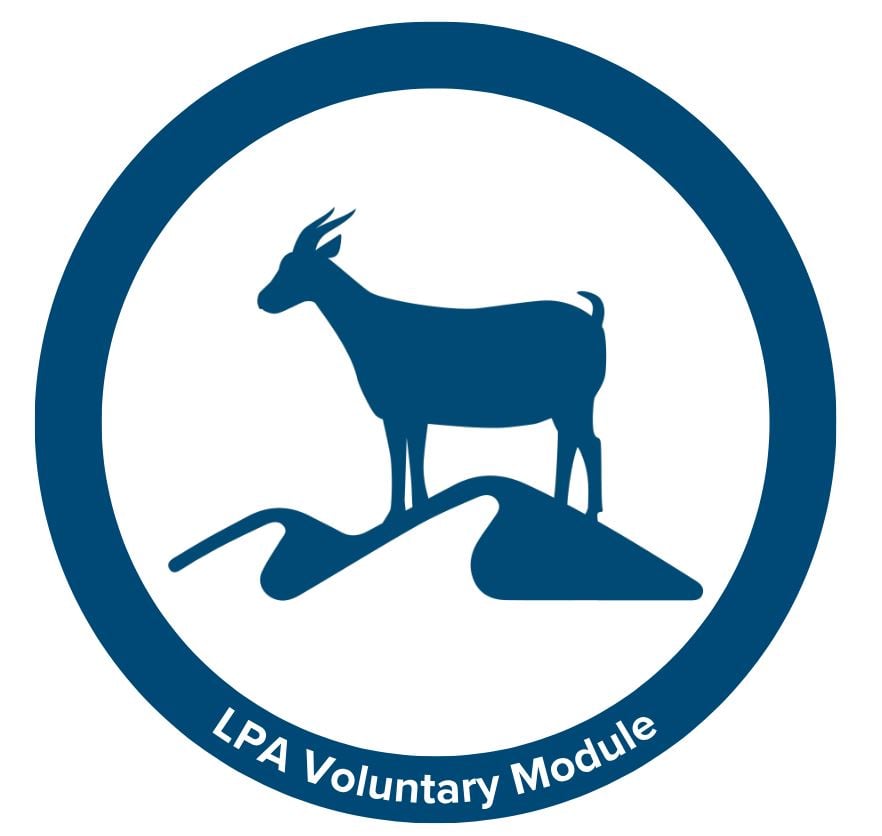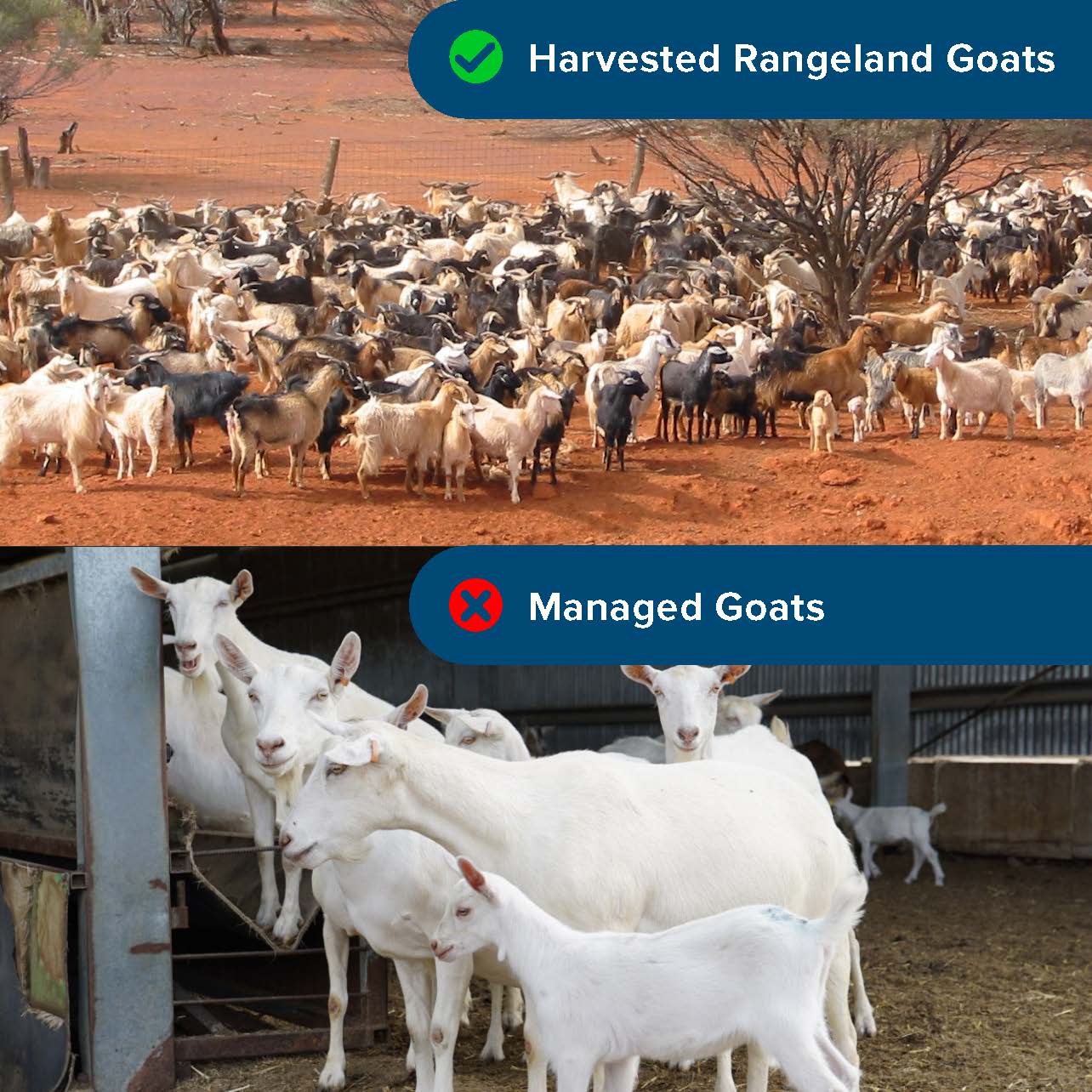What is the Harvested Rangeland Goat module?
The Harvested Rangeland Goat (HRG) module is a voluntary Livestock Production Assurance (LPA) module. It was developed to enable harvested rangeland goats to be moved direct to slaughter or via one registered goat depot without requiring individual electronic identification (eID).
From 1 January 2025 eID usage will commence for sheep and goats nationally. Full implementation dates will vary by state or territory. Accreditation with the HRG module creates a device-free movement option for HRGs. It also allows mob-based HRG movements to be recorded in the NLIS database. Accreditation in this module requires state or territory approval.

What is a Harvested Rangeland Goat
1.
It must be captured from a wild state.
2.
It cannot be born as a result from a managed breeding program.
3.
Not been subjected to any animal husbandry procedures or treatments.
How to apply
Applications open 1st October 2024. To become accredited with the Harvested Rangeland Goats (HRG) module you must first be accredited with Livestock Production Assurance (LPA) and have your account linked in your myMLA profile. Once you have done this, you can simply follow the state specific steps below.
How do I move Harvested Rangeland Goats eID Free?
Harvested Rangeland Goats (HRG) can ONLY be moved device-free from their property of capture if the following conditions are met:
Step 1:
Your PIC is LPA accredited and you are accredited in the LPA HRG module.
Step 2:
The goats meet the definition for a Harvested Rangeland Goat.
Step 3:
Goats are moving direct to an abattoir for slaughter or to one registered goat depot.
Step 4:
Goats must be accompanied by a correctly completed LPA HRG NVD or eNVD.
Step 5:
Registered Goat Depot or abattoir must record the mob-based movement on NLIS database within two days of the goats arriving.
Step 6:
Registered goat depot must have a letter from a processor indicating the depot will be a regular supplier of goats on a commercial basis.
Step 7:
Harvested Rangeland Goats must only be held at a registered goat depot for up to 10 days before moving directly to an abattoir for slaughter or have an eID applied.
Why are there different requirements for goats?
Australia is dedicated to traceability to protect our industry from emergency animal disease outbreaks or food safety risks with mandated individual electronic identification (eID) for sheep and goats in place from 1 January 2025.
Individually tagging goats harvested from a wild state is dangerous to both humans and goats and this is why a device-free approval pathway for Harvested Rangeland Goats (HRG) has been developed.
The HRG module has been developed to allow HRGs to move without an eID and be recorded as a mob-based movement in the NLIS database with approval from relevant states and territories and LPA.
Strict approval, audit and oversight of HRG accredited producers and registered goat depots are in place to ensure integrity and traceability.

FAQs
If the untagged HRGs are not moving directly to an abattoir for slaughter, and will instead be moved to another depot, a saleyard, property or to export, they MUST be tagged with a pink post-breeder NLIS device with the depot PIC.
To meet the requirements of moving HRG eID-free, harvested rangeland goats must only be held at a depot for up to 10 days before moving directly to an abattoir for slaughter. If the goats are retained in the depot for longer than 10 days, they MUST be tagged with a pink post breeder NLIS eID with the depot PIC.
After you have completed the HRG Self-Assessment questions and declaration, your state/territory department will be notified. They will assess your application. If your application is approved, you will be notified via email and you will then be able to pay for your HRG accreditation. This is in addition to the $90 (plus GST) fee for LPA accreditation. If your application is not approved, you will be notified via email of the outcome and the reason why.
Yes. Once approved in the HRG module, producers must undergo an LPA audit once every two years and goat depots will be audited annually.
No. This only impact persons who capture animals that are defined as Harvested Rangeland Goats which means the animals must meet the following criteria:
- Has been captured from a wild state; and
- Had not been as a result of a managed breeding program; and
- Has not been subjected to animal husbandry procedures or treatment; and
- Are moving directly to an abattoir for slaughter or via one registered goat depot only.
Goats that are managed in any way are not eligible to be moved as a harvested rangeland goat and must be identified with an eID and moved on a Goat NVD.
Mandatory individual electronic identification (eID) of goats comes into force from 1 January 2025. Tagging goats harvested from a wild state can be a danger to both humans and goats. The HRG module has been developed to allow HRGs to continue to move without an eID on a HRG NVD and be recorded as a mob-based movement in the NLIS database once the eID mandate begins.
A producer will be required to pay an additional accreditation fee of $90 (ex GST) to be part of the Harvest Rangeland Goat module. This additional fee will cover the following:
- Access to the Harvested Rangeland Goat module in the LPA database including accreditation, account management, self-services for buying LPA HRG book.
- To cover the audit cost of the Harvested Rangeland Goat module.
- Access to the eNVD web platform and eNVD mobile app.
A new Harvest Rangeland Goat NVD has been developed and will be available for use by HRG Accredited producers or goat depots. A paper NVD book will be available, and it will also be available for free via the eNVD web-based system and eNVD mobile application.
A Harvest Rangeland Goat NVD must be used when consigning eligible harvested rangeland goats to one registered goat depot or direct to an abattoir for slaughter or from a registered goat depot to an abattoir for slaughter.
You can only access the new Harvest Rangeland Goat National Vendor Declaration (NVD) or eNVD once their state and territory department has approved your application and payment has been made.
The existing Goat NVD has been updated to remove reference to harvested rangeland goats and tag free movements and will be available for use when moving managed goats from 1 January 2025. This includes printed Goat NVD books and eNVDs created via the free eNVD web-based and mobile application.
The existing goat NVD with version number G0720 will be invalid from 1 July 2025 and will be replaced by version G0524.